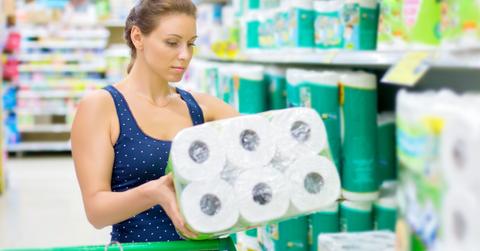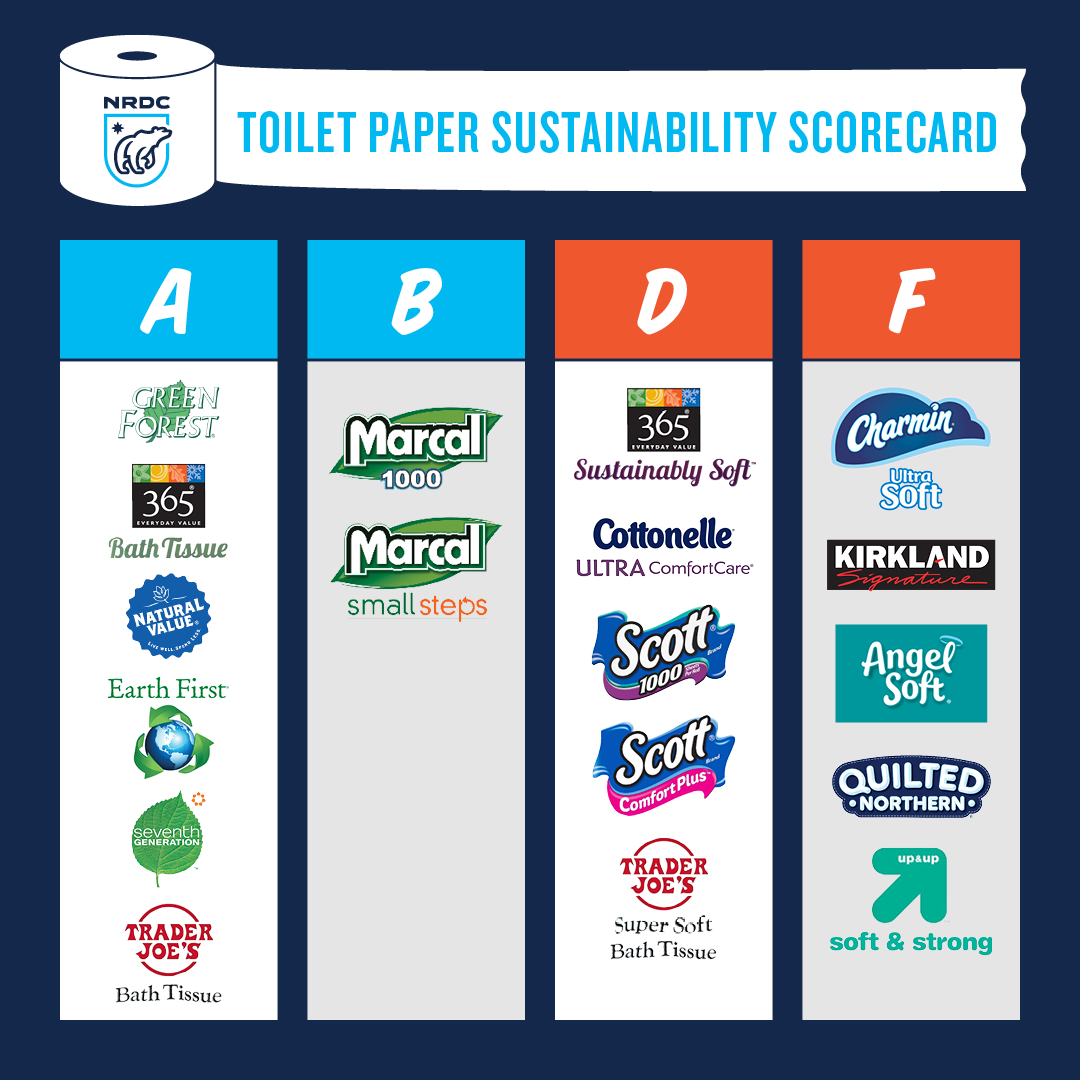New Report Reveals Which Sustainable Toilet Paper Brands Are Actually Sustainable — And Which Aren't
A new report ranks the most — and the least — eco-friendly toilet paper options on the market.
Updated Jan. 17 2020, 11:14 a.m. ET

When you think about it, using toilet paper is literally just flushing your money down, well, the toilet. But considering how much TP Americans use, wouldn't you like to wipe your tush in the most sustainable way possible? The Natural Resources Defense Council (NRDC) and Stand.earth recently joined forces to study a group of major toilet paper brands and determine how each ranks in terms of sustainability. Interestingly, some of the most popular "name brand" toilet papers received "F" scores — and the NRDC and Stand.earth are calling on those companies to make their processes more eco-friendly.
According to the report, titled “The Issue with Tissue,” the five brands that got "F" scores are: Charmin, Kirkland Signature (Costco's in-house brand), Angel Soft, Quilted Northern, and Up&Up Soft & Strong (Target's in-house brand). The brands that got "D" scores are: 365 Everyday Value's Sustainably Soft (Whole Foods' in-house brand), Cottonelle, Scott (both 1,000 and Comfort Plus), and Trader Joe's Super Soft Bath Tissue.
The report found that Procter & Gamble (which owns Charmin), Kimberly-Clark (which owns Scott), and Georgia-Pacific (which owns Angel Soft and Quilted Northern) do not use any recycled content in their toilet paper. Instead, these brands get their paper by clear-cutting the Canadian boreal forest, aka the “Amazon of the North.” According to a study published on Statista, Georgia-Pacific, Procter & Gamble, and Kimberly Clark made up nearly 80 percent of toilet paper sales in the U.S. in 2017, making it clear just how much power those corporations have. Not to mention, Amazon's top 26 best-selling toilet papers are all brands that scored "D" and "F" grades, with the exception of a few Amazon brand TPs.

“The Issue with Tissue” was written by Jennifer Skene, an environmental law fellow for the NRDC, and Shelley Vinyard, a boreal corporate campaign manager for the NRDC. Vinyard believes that as one of the country's leading toilet paper manufacturers, Procter & Gamble has the resources and responsibility to make a better choice for the earth. “We’re calling on Procter & Gamble, as the maker of America’s leading toilet paper brand, to stop flushing forests down the toilet," Vinyard said in a statement in the press release. "Procter & Gamble has the innovation resources to bring Charmin into the 21st century; the question is whether the company will embrace its reputation as an innovator to create sustainable products using recycled material instead of clear-cut trees.”
Anthony Swift, director of the NRDC's Canada Project, explained exactly why cutting down forests is so bad for the planet, even though trees are a renewable resource. “Most Americans probably do not know that the toilet paper they flush away comes from ancient forests, but clear-cutting those forests is costing the planet a great deal," he said in a statement. "Maintaining the Canadian boreal forest is vital to avoiding the worst impacts of climate change.” Additionally, as the press release pointed out, the destruction of the Canadian boreal forest also causes harm to Indigenous Peoples as well as animals who live in the forest, including the boreal caribou and Canada lynx.
Luckily, a few toilet paper brands managed to nab "A" and "B" scores on the NRDC and Stand.earth's scorecard. Coming in with "A" grades are: Green Forest, 365 Everyday Value's Bath Tissue (Whole Foods' other in-house brand), Natural Value, Earth First, Seventh Generation, and Trader Joe's Bath Tissue (the store's other in-house variety). And the only brand to get a "B" grade is Marcal, for both the 1,000 and Small Steps varieties. These brands scored higher because they use recycled paper to make their TP.
That said, there are plenty of other ways to make your toilet routine even more eco-friendly. Brands including Who Gives a Crap and Tushy make toilet paper out of bamboo, which can grow up to 39 inches in a day, making it a very sustainable option, as per Futurism. You can also invest in a bidet attachment for your toilet, which will reduce the amount of toilet paper you need after each bum spray (and eventually save you money on TP). If you're interested, New York Magazine has a list of bidet recommendations. And, for the super committed to reducing toilet paper use, there's family cloth, aka reusable cloth toilet paper, which went viral when BuzzFeed reported on it last year.
Basically, there are so many alternatives to toilet paper made from virgin TP, so don't be afraid to try out a more sustainable brand next time you go shopping. And if you are a diehard fan of one of the low-ranking brands, consider reaching out and asking your favorite TP company to consider integrating recycled paper into its manufacturing process.